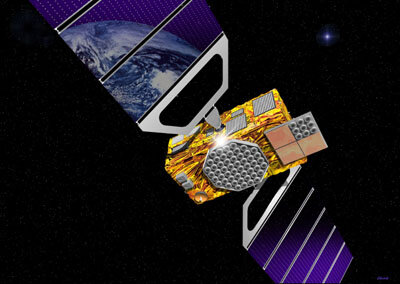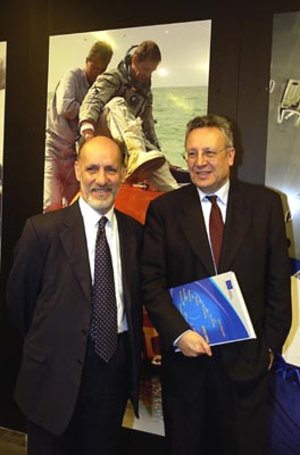European leaders discuss the future of space technology
Key decision-makers responsible for shaping Europe's future in space gathered in London yesterday, to discuss how to enhance Europe’s leading position in developing space technology.
Antonio Rodotà, Director-General of the European Space Agency, Philippe Busquin, European Research Commissioner, and Lord Sainsbury, UK Minister for Science and Technology, addressed over 350 representatives from government, industry and research.
This meeting was part of a series of consultation events on European space policy, following the publication of the EU Green Paper on Space. The consultation will be closed by a major conference in Paris on 23-24 June, paving the way for a White Paper and detailed Action Plan to be presented by the end of 2003. Today's conference specifically focused on how space R&D can lead to concrete applications and commercial products in a wide range of areas, such as telecommunications, navigation and localisation, and Earth observation.
Mr Rodotà said: "In the last three decades the European Space Agency has been widely involved in space applications and has helped place Europe at the forefront of the fast-moving world of telecommunications, internet and multimedia business. ESA has invested in new technologies and system concepts and has been the catalyst for European industry - including SMEs- to develop and exploit emerging products, services and markets. Our role has also been instrumental in sowing the seeds and fostering the growth of international organisations such as Eumetsat for weather forecasts and companies such as Eutelsat in the field of satellite telecommunications and Arianespace in that of launchers."

"Space and the way we exploit its potential can bring many benefits to the lives of all Europeans", said Commissioner Busquin. "We should turn space research into an engine that fuels Europe's economic fortunes and improves the quality of life of our citizens. Without investments in space R&D, we would not have many products that we take for granted today, such as internet by satellite and early warning systems for natural disasters. I urge everyone to participate in this debate on Europe's role in space before it concludes next month. I am confident Europe wants to be a region ready to explore new frontiers."
Lord Sainsbury added: "Working with our European partners is critical to the success of the UK's space ambitions. This is clearly demonstrated by the outstanding achievements Europe has made collectively in the last decade, particularly in satellite technologies. I am determined that the UK will continue to play an active role in driving forward European advances in space, participating fully in key activities such as Galileo and GMES (Global Monitoring for the Environment and Security) - Europe's satellite navigation, earth observation and security systems of the future. We are also contributing to the consultation on the Green Paper on Space, to help define the future blueprint for EU space policy."
Also intervening at the London event were Eryl McNally, Member of the European Parliament, Romain Bausch, President and CEO of SES Global, M. Giuliano Berretta, CEO and Chairman of Eutelsat S.A and President of the European Satellite Operators Association (ESOA), and Frank De Winne, Belgian-born ESA astronaut.
European institutions are bringing fresh momentum to the development of a European Space policy. On 13 May, the EU Competitiveness Ministers adopted a key resolution supporting reinforced co-operation between the European Commission and ESA to this end. This resolution calls for a rapid conclusion of a framework agreement between ESA and the European Commission, and for urgent actions to be taken at the EU level to answer the challenges faced by Europe's space sector, notably in launch services and commercial satellite markets. On 15 May, the European Parliament adopted a similar resolution, insisting that space be a shared competence in the new EU Treaty. Next week, on 27 May, the ESA ministerial meeting will address a series of key issues, notably, the future developments of the Ariane launcher.
Europe's cutting-edge space research

The idea of applying space technologies for Earth applications is not new. The European Union, with its extensive programmes of space-based scientific research, Earth observation and telecommunications, has a strong tradition of producing beneficial spin-offs. Today, business opportunities related to space applications remain enormous.
The EU space industry has developed numerous technologies now being used in ground-based applications. The investment made in space research is thus directly resulting in concrete improvements in the quality of life and security of citizens in Europe. Space programmes have raised technologies to new levels of performance, reliability and capacity, perfecting them to unprecedented levels, resulting in many new and beneficial applications back here on Earth.
The Galileo project and the GMES (Global Monitoring for the Environment and Security) initiative illustrate this new approach and underline the need for an enhanced role for the Union in space matters. They show how industrial and technological successes achieved by ESA can be maximised through joint space initiatives. The Commission has developed effective satellite-based environmental monitoring systems, to detect and help prevent offshore oil spills and other hazards. Another example of EU-sponsored space projects concerns satellite mapping of remote regions, such as in Afghanistan, where EU aid and rescue teams have been able to reach isolated villages in the aftermath of the 2001 earthquake thanks to accurate satellite positioning and mapping services.
Space technology for serving citizens
Space has been at the forefront of technology trends for decades. The demand for smaller and lighter materials and systems, for example, was largely stimulated by the space industry. The need to produce small, powerful, self-contained computers for space-related applications ultimately led to the development of PCs, as well as many other intelligent devices in areas such as cars and medical technologies.
Beyond computer technologies, space research has contributed to a wealth of concrete applications for scientists as well as citizens. The same technologies used in space-borne telescopes to study the cosmos are also helping to understand the workings of the human cell. Materials developed to protect space instrumentation from the heat of launcher engines can now be found in theatre seat upholstery, reducing the risk of fire.
Business opportunities beyond the space industry
Space technologies represent opportunities for players other than those within the "traditional" space industry - including SMEs, service providers, content providers and private and public users. Digital television, third generation mobile communications and satellite-delivered Internet are good examples of service platforms to which space-systems contribute.
Transferring space technologies from the research to industry and shifting from "blue sky" research to commercial applications and from space-specific to other sectors - are a top priority for Europe. One of the key questions raised by the Green Paper on European Space Policy and discussed in London, is to assess "What are the conditions for the emergence of economically viable and competitive applications and space services for citizens and industries?"





